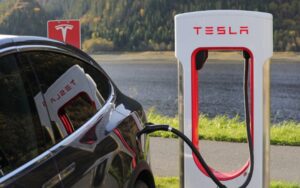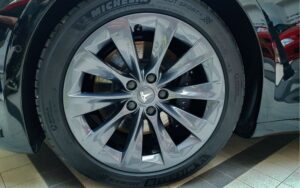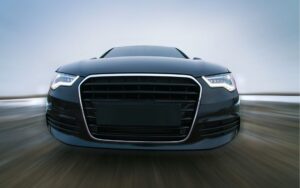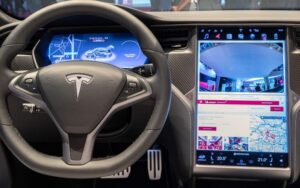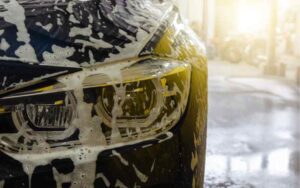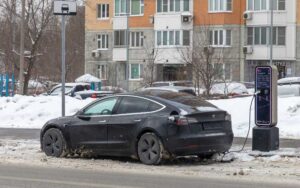7 Astonishing Tesla Battery Facts Revealed!
Tesla never ceases to amaze their customers and new owners with upgraded models and trim levels, high-quality internal components, smart software, and high-capacity batteries.
These batteries are unique and set Tesla vehicles above other companies in the electric vehicle industry.
And just like the engine powers oil-based automobiles, Tesla batteries serve as the powerhouse of Tesla electric vehicles.
With that established, what are other interesting facts about Tesla batteries?
Tesla batteries undergo proper manufacturing processes to produce exceptional capacity and store energy. Furthermore, Tesla owners can use Tesla batteries for approximately 8-12 years before requiring repairs or replacement. Also, Tesla batteries come in different sizes and contain different capacities.
In this article, I’ll explain the facts you need to know about Tesla batteries, what they are made of, and much more.
7 Facts About Tesla Batteries
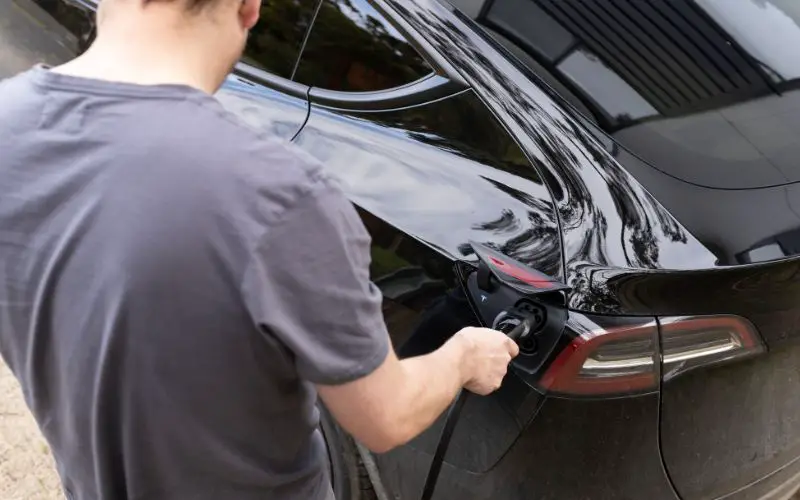
Tesla batteries have been topping the charts for many years as they serve as the powerhouse of Tesla electric vehicles.
Hearing and constantly seeing the growth of Tesla due to its high-quality components, especially the battery, piques the interest of many Tesla owners.
This makes one wonder about the interesting facts about Tesla batteries. With that established, I’ll accentuate seven facts about Tesla batteries.
#1. Long Lifespan
Tesla batteries are widely known for their long lifespan, enabling Tesla owners to use their vehicles conveniently without problems.
These batteries usually last for up to 8-12 years before requiring repairs or replacement. The good news is that Tesla has a warranty covering the vehicle’s battery.
Once this warranty expires, you’ll pay for all the repairs and replacements. The duration of Tesla batteries is what puts them above other batteries in the market.
Getting an electric vehicle that offers a long battery lifespan is what every car owner desires, as it eliminates constant repairs or replacements.
Notwithstanding, you can easily replace your Tesla battery with a new one if it malfunctions.
#2. High Energy Density
Most Tesla batteries usually provide high energy density, increasing the battery’s capacity and extending the electric vehicle’s cruising range.
For instance, the 4680 battery has a high energy density that boots the efficiency of Tesla electric vehicles.
#3. High Charging Rate
Most Tesla batteries have a high charging rate. In other words, you can charge your Tesla batteries for a short time.
This battery eradicates the concerns of Tesla owners about slow charging. Imagine charging your Tesla battery for 3 hours only to discover it’s just 10%.
That situation can be quite frustrating. Nonetheless, you can purchase the right Tesla battery to avoid these circumstances.
#4. Reduction of Costs
Due to the Tesla battery’s durability, you don’t have to spend on repairs or replacement, saving money for other important issues.
Furthermore, Tesla batteries are affordable, and you can easily purchase them in reliable stores when you want to replace your old battery with a new one.
#5. Different Sizes
Tesla batteries usually come in different sizes that fit many models of Tesla. Choosing the right battery size for your Tesla is vital as it ensures the smooth running of your car.
If you’re perplexed about the size of your battery, you can check the specifications in your owner’s manual. Alternatively, you can read the labels on the sticker of your battery.
Knowing the right size of your Tesla battery can go a long way in maintaining the health of your vehicle and avoiding unfortunate situations.
#6. Energy Storage
One remarkable feature of Tesla batteries is their ability to store energy for proper use by the electric vehicle.
Most Tesla batteries store up to 0.1 kWh of energy and can be used at any time by the vehicle.
#7. Weight
Many Tesla batteries are light and weigh approximately 4 Ibs (11.8 kg). This makes the battery easy to carry and replace.
However, some Teslas may weigh more than 11.8 kg. Nonetheless, you can carry out your battery replacement smoothly due to the battery’s lightweight.
Will Tesla Batteries Work in Other EVs?
Tesla batteries will work in other electric vehicles. However, many electric cars harbor a complicated battery management system (BMS).
Hence, the battery may not be a perfect match for the electric vehicle in question. But this depends on the BMS of the electric vehicle.
Although Tesla batteries are widely known for their remarkable features, some electric vehicles might not function if they use Tesla batteries.
Every electric vehicle has an original battery designed and manufactured to perform many functions.
Hence, using a different battery during replacement may cause some problems. For instance, it may draw excessive power and cause the battery to overheat.
Furthermore, it may increase the cooling temperature, adversely affecting your vehicle.
While replacing the original battery of your electric vehicle can be a great change, it could cause devastating effects.
Therefore, it’s imperative to check the compatibility of the Tesla battery with your electric vehicle, as this procedure can prevent many unwanted problems.
It’s best to settle for a high-quality Tesla battery when replacing the original battery of your electric vehicle.
High quality is of paramount importance when it comes to purchasing any component of your vehicle.
Hence, it’s wise not to compromise this crucial factor. Settling for a low-quality Tesla battery will only cause more harm than good.
You can purchase a high-quality Tesla battery at certified stores and directly from Tesla’s store.
Furthermore, you can take your electric vehicle to a professional to help you in replacing the battery with a new one.
Alternatively, if you have enough experience, you can replace the battery without the assistance of an expert.
But you can ask an expert for the right tools and a proper guide on replacing the battery.
You can do this at your convenience; however, if you encounter problems during the replacement, contact a professional immediately to avoid damage to your vehicle.
What Are Tesla Batteries Made of?
Tesla batteries are made of lithium iron phosphate, which is relatively easy to purchase.
LFPs are composed of lithium, iron, and phosphate, which are readily available in the market.
The raw materials for manufacturing the Tesla batteries are affordable. Hence, Tesla orders them in large quantities.
Typically, Tesla batteries are composed of thousands of lithium-ion cells that are rechargeable.
Furthermore, the battery contains many hardware and software parts to ensure its functionality and consistent efficiency.
Also, Tesla batteries are composed of nickel cobalt aluminum and nickel cobalt manganese. These compositions include nickel, cobalt, aluminum, and manganese.
However, some of these components are difficult to obtain and are expensive. Plus, Tesla batteries that contain NCA or NCM are unstable, especially at high charging states.
This usually happens when the battery is charged above 90%. Hence, it’s crucial to charge the battery to exactly 90% or less for proper stability.
Are Tesla Batteries Bad for the Environment?
Although Tesla batteries have contributed immensely to the growth of electric vehicles, they still pose a threat to the environment.
Manufacturing Tesla batteries usually cause high emissions of carbon. This release of CO2 into the environment occurs during the production process of Tesla batteries.
This challenging process often involves extracting the primary materials, including lithium, manganese, and cobalt.
Admittedly, these complex components are quite difficult to extract and might involve intensive mining.
That’s where the problem comes in, as this process releases pollutants into the environment.
For instance, lithium is primarily extracted in South America and China from brine reservoirs that are underground or salt flats.
This process usually utilizes a huge amount of groundwater, which leads to huge water loss, making it difficult for farmers in the location to carry out irrigation.
Furthermore, drinking water will be unavailable for the local communities in that area.
Plus, after the extraction of lithium, the liquid substance left is toxic and contains radioactive elements.
Hence, this liquid substance needs to be thoroughly cleaned and kept in a safe place; otherwise, it might cause harm if left in its original state.
On the other hand, cobalt is mined in Australia, although it’s a byproduct obtained during the mining of nickel and copper.
Mining cobalt directly has more devastating environmental effects as it’s one of the most difficult materials to extract for producing electric vehicle batteries.
Mining cobalt often releases toxic substances that find their way into the environment. These toxic substances poison groundwater.
This could cause harm to residents if they consume the water unknowingly.
Furthermore, fumes are released into the environment with a highly concentrated amount of SO2 and many air pollutants.
Finally, manganese is often extracted in open pit mines as it’s one of the most abundant metals found on earth. Most times, manganese is discovered along with iron deposits.
Nonetheless, manganese is often manufactured in China, South Africa, India, Australia and Brazil.
Mining manganese in open pits usually causes air pollution, especially when the area is dry. The dust arising from the mines can disrupt the peace of the residents.
Additionally, manganese releases chemical properties that can adversely affect the water and soil.
With these facts established, it’s quite clear that producing Tesla batteries harms the environment.
However, these effects can be reduced by manufacturing Tesla batteries far away from residential or local areas.
Plus, the byproducts of these raw materials should be extracted safely, cleaned, and kept in a safe place.
Notwithstanding, the table below contains the materials Tesla uses to produce its batteries and the effects they cause.
| Materials | Effects |
|---|---|
| Lithium | It releases toxic substances that contain radioactive elements. |
| Cobalt | It poisons groundwater. |
| Manganese | It releases chemicals that affect the water soil. |

Hey, I’m Michael Davis, a 35-year-old with a degree and a love for cars and tech. Since I was a kid, cars have been my thing—so much that I even thought they ran on magic beans! Fast forward, and I’ve built Vehicle Army, your one-stop-shop for easy-to-understand car facts.

